
Findings from a Polish phase III study point to an additional treatment option for patients with advanced rectal cancer.
Patients who received short-course (five-day) radiation followed by consolidation chemotherapy before surgery achieved similar outcomes as those treated with five-week chemoradiation.
The study was presented at the 2016 Gastrointestinal Cancers Symposium in San Francisco.
“There is a great need for improvement of pre-operative strategies for patients with locally advanced rectal cancer,” said study co-author Lucjan Wyrwicz, MD, PhD, head of Medical Oncology Unit in Department of Gastrointestinal Cancer at the Maria Sklodowska-Curie Memorial Cancer Center and Institute of Oncology in Warsaw, Poland.
“The new regimen has similar efficacy but causes fewer side effects and is more convenient for patients. It is also less costly compared to standard chemoradiation, so it may be especially valuable in limited-resource settings.”
Chemoradiation therapy is often used in rectal cancer before surgery to reduce tumour size and lower the chance that the cancer will recur.
Chemoradiation is the standard of care in the United States and some European countries.
The radiation treatment lasts more than five weeks, with concurrent use of chemotherapy in the first and fifth week.
The experimental regimen explored in this study consists of five days of radiation therapy and six days (three two-day cycles) of chemotherapy delivered over a period of seven weeks.
The study enrolled 515 patients with locally advanced rectal cancer (stage cT3 or cT4).
The patients were assigned to chemoradiation or the experimental (short-course radiation) regimen.
Patients in the chemoradiation group received fluourouracil (5-FU), leucovorin, and oxaliplatin chemotherapy with the radiation, whereas those in the experimental group received the same agents in the so-called FOLFOX4 regimen after the short course radiation.
It should be noted that the addition of oxaliplatin to 5-FU and radiation is not considered standard therapy and is known to be more toxic than 5-FU with radiation.
Both groups of patients underwent surgery about 12 weeks after starting radiation therapy.
A similar proportion of patients in either group were able to undergo radical surgery after radiation therapy.
The rates of acute toxicity were lower in the experimental group compared to the chemoradiation group (74% vs. 83%).
The major toxicities associated with radiotherapy include inflammation of the rectum, diarrhoea, inflammation of the bladder, and local skin radiation response.
At three years, the disease-free survival was not statistically different between the two groups (53% in the experimental group vs. 52% in the chemoradiation care group).
The initial report indicates improvement in the rates of overall survival (73% in the experimental group vs. 63.5% in the chemoradiation group).
"If this survival benefit is confirmed with longer follow-up, it might ultimately result in change to the clinical practice in patients with locally advanced rectal cancer similarly to the studied group of patients" added Dr Wyrwicz.
According to the authors, short-course radiotherapy may be a particularly helpful option for patients with advanced rectal cancer with metastases in the liver or lungs who are potential candidates to have all sites of disease resected.
A shorter duration of radiotherapy allows such patients to start chemotherapy to control metastases much earlier.
"This method is implemented in the treatment strategy of our patients in the Maria Sklodowska-Curie Memorial Cancer Center and seems to be feasible and effective also in this rare subgroup of patients," stated Dr Wyrwicz.
Source: ASCO
We are an independent charity and are not backed by a large company or society. We raise every penny ourselves to improve the standards of cancer care through education. You can help us continue our work to address inequalities in cancer care by making a donation.
Any donation, however small, contributes directly towards the costs of creating and sharing free oncology education.
Together we can get better outcomes for patients by tackling global inequalities in access to the results of cancer research.
Thank you for your support.